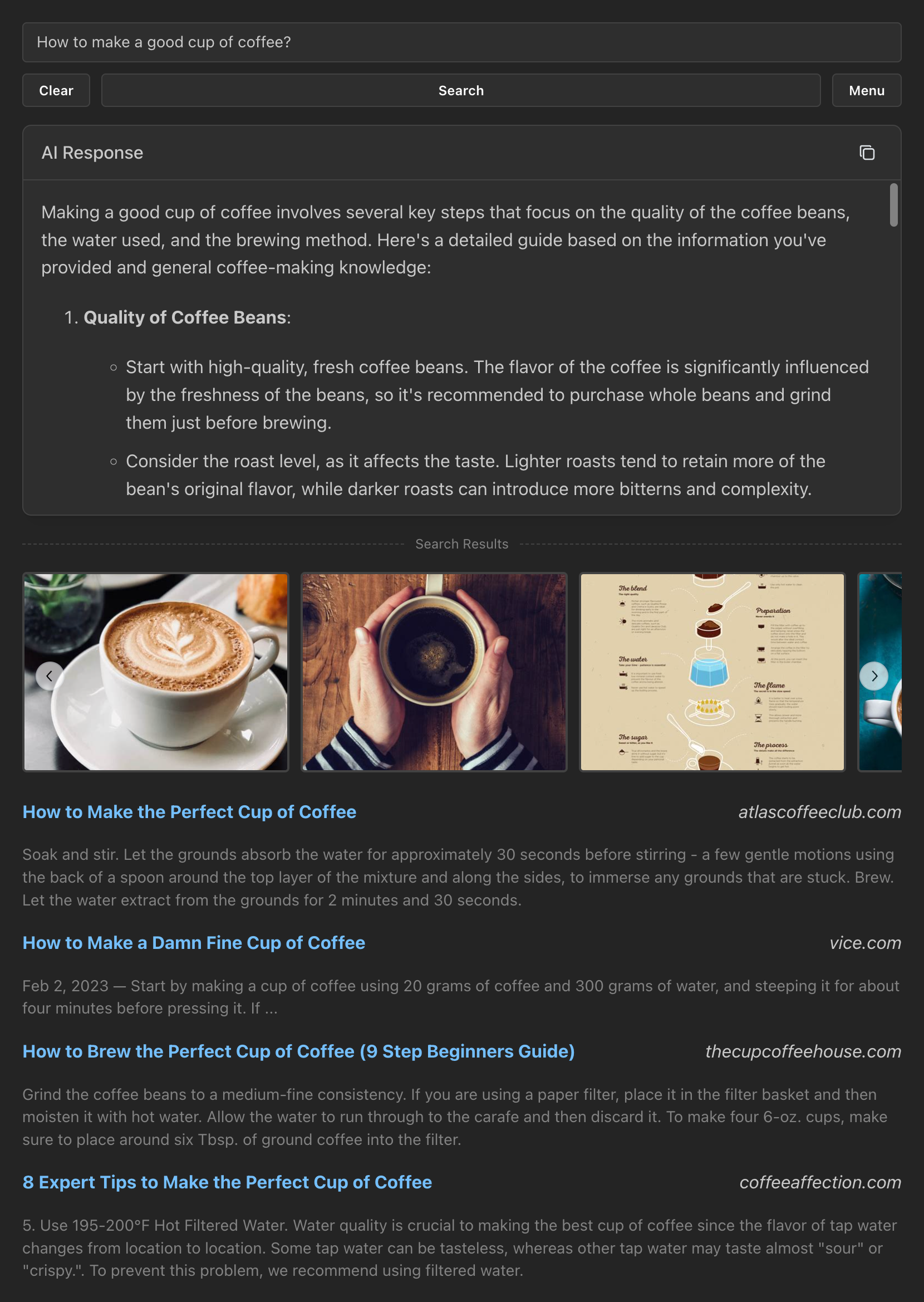---
title: MiniSearch
emoji: 👌🔍
colorFrom: yellow
colorTo: yellow
sdk: docker
short_description: Minimalist web-searching app with browser-based AI assistant
pinned: false
custom_headers:
cross-origin-embedder-policy: require-corp
cross-origin-opener-policy: same-origin
cross-origin-resource-policy: cross-origin
---
[![Hugging Face space badge]][Hugging Face space URL]
[![GitHub workflow status badge][GitHub workflow status badge]][GitHub workflow status URL]
[![Hugging Face sync status badge]][Hugging Face sync status URL]
[![Docker Hub][Docker Pulls Badge]][Docker Hub URL]
[![Apache License Badge]][Apache License, Version 2.0]
# MiniSearch
A minimalist web-searching app with an AI assistant that runs directly from your browser.
Live demo: https://huggingface.co/spaces/QubitPi/miniSearch
## Screenshot

## Features
- **Privacy-focused**: [No tracking, no ads, no data collection](https://docs.searxng.org/own-instance.html#how-does-searxng-protect-privacy)
- **Easy to use**: Minimalist yet intuitive interface for all users
- **Cross-platform**: Models run inside the browser, both on desktop and mobile
- **Integrated**: Search from the browser address bar by setting it as the default search engine
- **Efficient**: Models are loaded and cached only when needed
- **Customizable**: Tweakable settings for search results and text generation
- **Open-source**: [The code is available for inspection and contribution at GitHub](https://github.com/QubitPi/MiniSearch)
## Prerequisites
- [Docker](https://docs.docker.com/get-docker/)
## Getting started
There are two ways to get started with MiniSearch. Pick one that suits you best.
**Option 1** - Use [MiniSearch's Docker Image][Docker Hub URL] by running:
```bash
docker run -p 7860:7860 jack20191124/mini-search:main
```
**Option 2** - Build from source by [downloading the repository files](https://github.com/QubitPi/MiniSearch/archive/refs/heads/main.zip) and running:
```bash
docker compose -f docker-compose.production.yml up --build
```
Then, open http://localhost:7860 in your browser and start searching!
## Frequently asked questions
How do I search via the browser's address bar?
You can set MiniSearch as your browser's address-bar search engine using the pattern http://localhost:7860/?q=%s, in which your search term replaces %s.
Can I use custom models via OpenAI-Compatible API?
Yes! For this, open the Menu and change the "AI Processing Location" to Remote server (API). Then configure the Base URL, and optionally set an API Key and a Model to use.
How do I restrict the access to my MiniSearch instance via password?
Create a .env file and set a value for ACCESS_KEYS. Then reset the MiniSearch docker container.
For example, if you to set the password to PepperoniPizza, then this is what you should add to your .env:
ACCESS_KEYS="PepperoniPizza"
You can find more examples in the .env.example file.
I want to serve MiniSearch to other users, allowing them to use my own OpenAI-Compatible API key, but without revealing it to them. Is it possible?
Yes! In MiniSearch, we call this text-generation feature "Internal OpenAI-Compatible API". To use this it:
- Set up your OpenAI-Compatible API endpoint by configuring the following environment variables in your
.env file:
INTERNAL_OPENAI_COMPATIBLE_API_BASE_URL: The base URL for your APIINTERNAL_OPENAI_COMPATIBLE_API_KEY: Your API access keyINTERNAL_OPENAI_COMPATIBLE_API_MODEL: The model to useINTERNAL_OPENAI_COMPATIBLE_API_NAME: The name to display in the UI
- Restart MiniSearch server.
- In the MiniSearch menu, select the new option (named as per your
INTERNAL_OPENAI_COMPATIBLE_API_NAME setting) from the "AI Processing Location" dropdown.
How can I contribute to the development of this tool?
Fork this repository and clone it. Then, start the development server by running the following command:
docker compose up
Make your changes, push them to your fork, and open a pull request! All contributions are welcome!
Why is MiniSearch built upon SearXNG's Docker Image and using a single image instead of composing it from multiple services?
There are a few reasons for this:
- MiniSearch utilizes SearXNG as its meta-search engine.
- Manual installation of SearXNG is not trivial, so we use the docker image they provide, which has everything set up.
- SearXNG only provides a Docker Image based on Alpine Linux.
- The user of the image needs to be customized in a specific way to run on HuggingFace Spaces, where MiniSearch's demo runs.
- HuggingFace only accepts a single docker image. It doesn't run docker compose or multiple images, unfortunately.
License
-------
The use and distribution terms for [MiniSearch]() are covered by the [Apache License, Version 2.0].
[Apache License Badge]: https://img.shields.io/badge/Apache%202.0-F25910.svg?style=for-the-badge&logo=Apache&logoColor=white
[Apache License, Version 2.0]: https://www.apache.org/licenses/LICENSE-2.0
[Docker Pulls Badge]: https://img.shields.io/docker/pulls/jack20191124/mini-search?style=for-the-badge&logo=docker&color=2596EC
[Docker Hub URL]: https://hub.docker.com/r/jack20191124/mini-search
[GitHub workflow status badge]: https://img.shields.io/github/actions/workflow/status/QubitPi/MiniSearch/on-push-to-main.yml?branch=master&style=for-the-badge&logo=github&logoColor=white&label=CI/CD
[GitHub workflow status URL]: https://github.com/QubitPi/MiniSearch/actions/workflows/on-push-to-main.yml
[Hugging Face space badge]: https://img.shields.io/badge/Hugging%20Face%20Space-MiniSearch-FFD21E?style=for-the-badge&logo=huggingface&logoColor=white
[Hugging Face space URL]: https://huggingface.co/spaces/QubitPi/miniSearch
[Hugging Face sync status badge]: https://img.shields.io/github/actions/workflow/status/QubitPi/MiniSearch/on-push-to-main.yml?branch=master&style=for-the-badge&logo=github&logoColor=white&label=Hugging%20Face%20Sync%20Up
[Hugging Face sync status URL]: https://github.com/QubitPi/MiniSearch/actions/workflows/on-push-to-main.yml